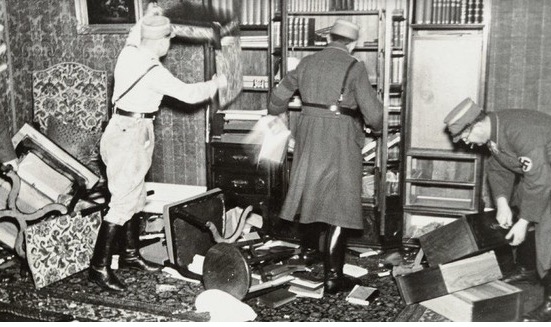SAY WHAT? - Last week - we apologize for tech delays - marked the 84th anniversary of Kristallnacht, the infamous night in 1938 when German Nazis orchestrated a wave of violence against its Jewish citizens now widely deemed the start of a Holocaust that ultimately murdered over six million. Reports after the Nov. 9-10 "Night of Broken Glass" across Germany and Austria said 92 people were killed, about 7,500 homes and businesses were looted or burned, 267 synagogues went up in flames; today, historians say those numbers were much higher, with at least 1,300 people killed and over 1,400 synagogues, or most of them, destroyed. There is general agreement that 30,000 people were also arrested and sent to concentration camps in what was the first instance of Nazi state-sanctioned violence - though they long denied it - in a systematic effort to annihilate Europe’s Jews. The first anti-Jewish laws were passed soon after that night, which marked the end of the ability of Jews to lead public lives in Germany and the start of a massive exodus from Europe; of those who stayed, millions - two out of three - died in concentration camps.
In observance of the inception of a historically unprecedented genocide that rendered Auschwitz "a new theological starting point," Germany's KFC marked the dark occasion with an app alert to customers proclaiming, "It's memorial day for Kristallnacht! Treat yourself with more tender cheese on your crispy chicken. Now at KFCheese!" About an hour later, even as Jewish leaders declared the message "absolutely hideous," the fast food behemoth sent another, frantic one: "SORRY, WE MADE A MISTAKE." The company went on to apologize for a technical lapse resulting in “a non-approved notification.” "Due to an error in our system," they wrote in German, "we sent an incorrect and inappropriate message"; they blamed it on an automated content creation process linked to a calendar of national observances to help sell more chicken. While they declined to consider the possibility it's also inappropriate to pester customers to buy stuff on every friggin' holiday, they said they'd review their internal processes to ensure it doesn't happen again, asserting, ”We understand and respect the gravity and history of this day."
Startlingly, and aptly at a time of rising anti-Semitism, new evidence continues to add to that understanding. On last week's anniversary, Israel's Yad Vashem Holocaust Memorial released harrowing, previously unseen images of Kristallnacht - smiling, well-dressed Germans watching a Nazi officer smash a storefront window, brownshirts carting off armloads of Jewish books for burning, Nazis splashing gas on synagogue pews - from a photograph collection newly donated by the family of a Jewish American soldier then serving in Germany. The images, evidently taken by Nazi photographers during pogroms in Nuremberg and nearby Fürth, document the violence in unusually intimate ways. For the first time, they also reveal not just the complicity but the direct involvement of uniformed Nazi officers in state-orchestrated carnage, thus dispelling the myth the attacks were "a spontaneous outburst of violence" by the German public, said Jonathan Matthews, head of Yad Vashem's photographic archives: "This was dictated from above." Yad Vashem officials say the photos will "serve as everlasting witnesses long after the survivors are no longer here to bear testimony." They can also remind us "where hate speech can lead." "It started with words," survivors avow. "Words can kill."
(Abby Zimet has written CD's Further column since 2008. A longtime, award-winning journalist, involved in women's, labor, anti-war, social justice and refugee rights issues. Email: [email protected])






